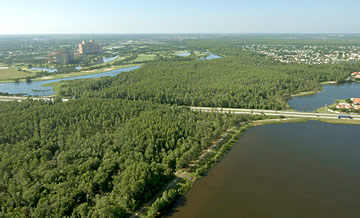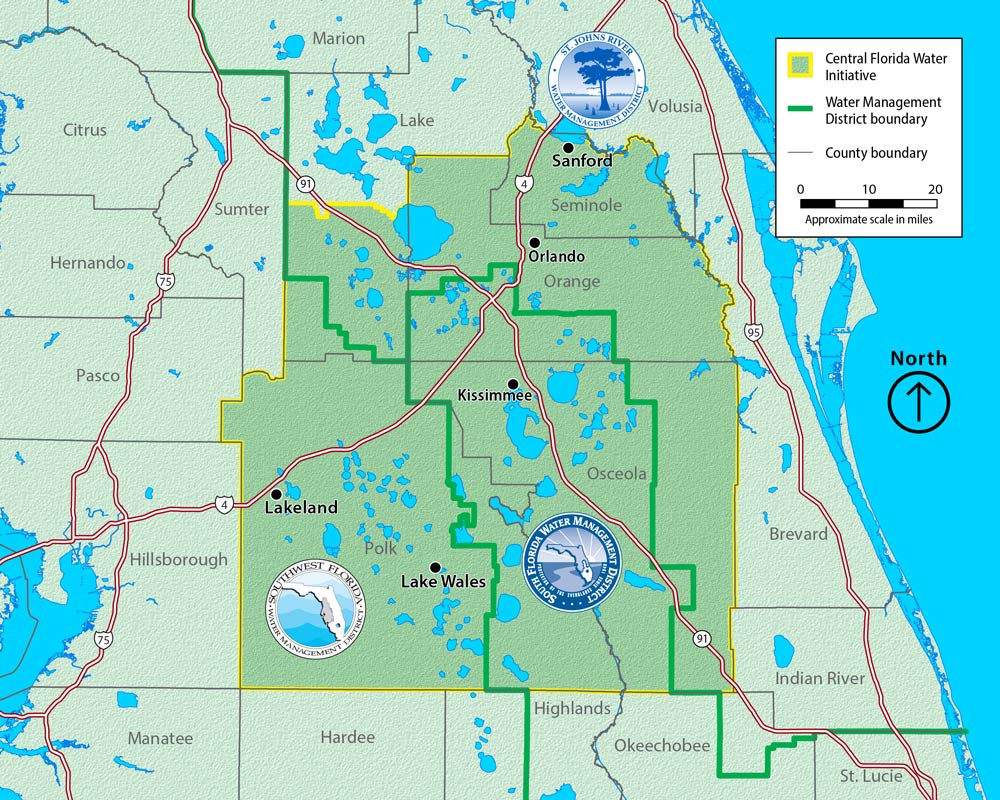Overview of the Central Florida Water Initiative
Florida’s water management districts are committed to finding new ways of meeting the demand for freshwater. Historically, the Floridan aquifer system has supplied the vast majority of the water used in the central Florida area. The boundaries of three water management districts — the St. Johns River Water Management District, South Florida Water Management District and Southwest Florida Water Management District — meet in the area. The three districts are studying whether the Floridan aquifer system is reaching its sustainable limits of use and exploring the need to develop supplemental sources of water.
In the past, the three districts worked independently to resolve water resource issues, but the decisions of one district can impact the water resources of another. Today, the districts are working collaboratively with other agencies and stakeholders to implement effective and consistent water resource planning, development and management through the Central Florida Water Initiative (CFWI).
The CFWI builds on the prior work of the Central Florida Coordination Area (CFCA). Both efforts focus on an area that includes southern Lake, Orange, Osceola, Seminole and Polk counties. The three water management districts, along with the Florida Department of Environmental Protection (DEP), Florida Department of Agriculture and Consumer Services (DACS), regional public water supply utilities and other stakeholders are collaborating to develop a unified process to address central Florida’s current and long-term water supply needs.
Steering Committee
A Steering Committee oversees the CFWI process and provides guidance to the technical teams and technical oversight/management committees that are developing and refining information on all aspects of central Florida’s water resources. The Steering Committee includes a:
- Public water supply utility representative
- Governing Board member from each of the three water management districts
- Representative from DEP
- Representative from DACS
Guiding principles
The guiding principles for the Central Florida Water Initiative process were initially designed to ensure that we have the water we need by:
- Identifying the sustainable quantities of traditional groundwater sources available for water supplies that can be used without causing unacceptable harm to the water resources and associated natural systems.
- Developing strategies to meet water demands that are in excess of the sustainable yield of existing traditional groundwater sources.
- Establishing consistent rules and regulations for the three water management districts that meet their collective goals, and implement the results of the Central Florida Water Initiative.
In April 2016, to continue the collaborative process, the Steering Committee adopted the CFWI 2020 Guiding Principles to:
- Review and update the 2015 CFWI Regional Water Supply Plan (RWSP), as well as the sustainable quantities of traditional groundwater sources available in the CFWI area that can be used without causing unacceptable harm to the water resources and associated natural systems.
- Monitor progress of regional strategies and solutions identified in the 2015 CFWI Plan; review and update strategies to meet water demands that are in excess of the sustainable yield of existing traditional groundwater sources.
- Establish consistent rules and regulations for the three water management districts that meet the Collaborative Process Goals and implement the results of this Central Florida Water Initiative.
- Encourage funding for regional strategies necessary to achieve the objectives of the CFWI.

The Central Florida Parkway passes central Florida’s theme park region and communities.
Technical teams
The Management Oversight Committee oversees technical teams, ensures coordination among the teams and identifies policy issues that need to be elevated to the Steering Committee as the process evolves. The Committee is comprised of representatives of the executive management teams from each of the water management districts, DEP and public water supply utilities.
Specialized Technical Collaborative Teams focus on specific issues, including:
- Conservation
- Regulatory coordination
- Regional water supply plan
- Water resource assessment
